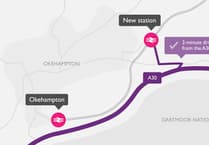STRIKE action by rail union the RMT at Network Rail on March 16 has been called off after a new pay deal was received.
The surprise development will raise hopes of a breakthrough in the long-running dispute between rail workers and the rail industry.
RMT members at Network Rail will have a referendum on the updated offer.
But workers at Great Western Railway, which serves routes in South Devon, are among 14 train operating companies still due to strike on the same day.
However with Network Rail workers no longer joining them, disruption will not be on the same scale and is likely to vary by operator.
Network Rail chief executive Andrew Haines said he was ‘relieved’ action had been suspended.
RMT members who work for train companies, including train guards, are currently set to continue action, with strikes set for March 18 and 30 and April 1 as well as next Thursday, March 16.
A spokesperson from the Department of Transport urged the RMT’s leaders to allow members who work at train companies to vote on the final offer.
Last month the RMT rejected what the industry and government described as ‘best and final’ offers.
One was from Network Rail and the other from the Rail Delivery Group (RDG), representing 14 train companies employing guards and station staff.
The employers had previously offered pay rises of 5 per cent for 2022/23 and 4 per cent for 2023/4, in exchange for changes to working practices, which the smaller rail union the TSSA has accepted.
It is understood that no new money has been put on the table by the government as part of the revised offer, but some changes have been made to the pay element of the proposals which were rejected last month.
The RDG has now invited the RMT for urgent talks.
The RMT has previously said it is ‘focused on coming to a negotiated settlement’ and it had carried out an ‘in-depth consultation’ before the decision to reject the pay offer was made.
The industry and government have said all along that any pay increase must come with changes to working practices.
Now, the RMT has said it is seeking an unconditional pay offer, among other requests.
Strikes have been taking place across the country's railways since June last year.
Unions have argued any pay offer should reflect the rising cost of living which is currently above 10per cent.




